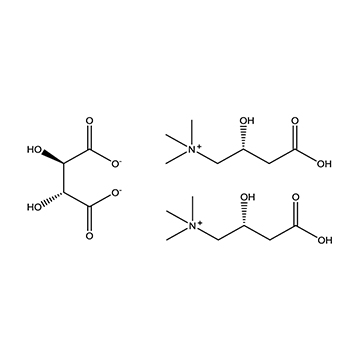
L-Carnitine tartrate is the supplement form of carnitine, a substance that plays a role in energy production. Your body typically makes enough carnitine to meet its needs. Therefore, it's not necessary for healthy adults to take carnitine supplements, according to the Office of Dietary Supplements. Nevertheless, allow for its role in energy production, manufacturers market carnitine tartrate for sports performance and fat loss. Carnitine may provide benefits for heart patients. Consult your doctor before taking carnitine supplements.
1.Prevent heart disease and improve heart problems
2.Increase the strength of muscle and bone
3.Promote the conversion of fat into energy Treatment of hemorrhagic shock
4.As a feed additive
|
Content specifications |
Applicable
Animals
|
Recommended dosage in compound feed or total mixed diet(calculated by vitamins) |
Maximum limit in compound feed or total mixed diet(calculated by vitamins) |
|
Calculated by vitamins |
|||
|
L-Carnitine≥ 66.85
L-Tartaric acid≥ 31.66%
|
pet |
Appropriate use according to production needs |
Dog 660 mg/kg
Adult cat(except breeding period) 880 mg/kg (calculated by L-Carnitine)
|
LCLT is used in pharmaceutical ,food as dietary supplement,and also found also well use in cosmetics.
There are several different forms of carnitine available. Here are a few of the most common types:
Acetyl-L-Carnitine HCL: This type of carnitine is thought to benefit brain health and memory and has been processed so that it’s able to easily pass the blood-brain barrier.
DL-Carnitine HCL :This type is used for promote fatigue recovery,boost stamina,enhances weight loss,boost stamina,delay aging.
L-Carnitine Base :This type is good for healthcare of heart and blood vessels and eliminate the fatty live,etc.
Propionyl-L-Carnitine HCL: This form helps increase levels of nitric oxide in the body, which dilates the blood vessels to promote better blood flow.
L-Carnitine Fumarate: Preliminary research suggests that this type of carnitine could help support bone health to protect against age-related bone loss.